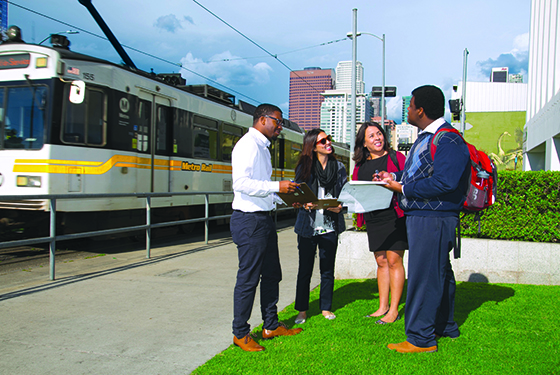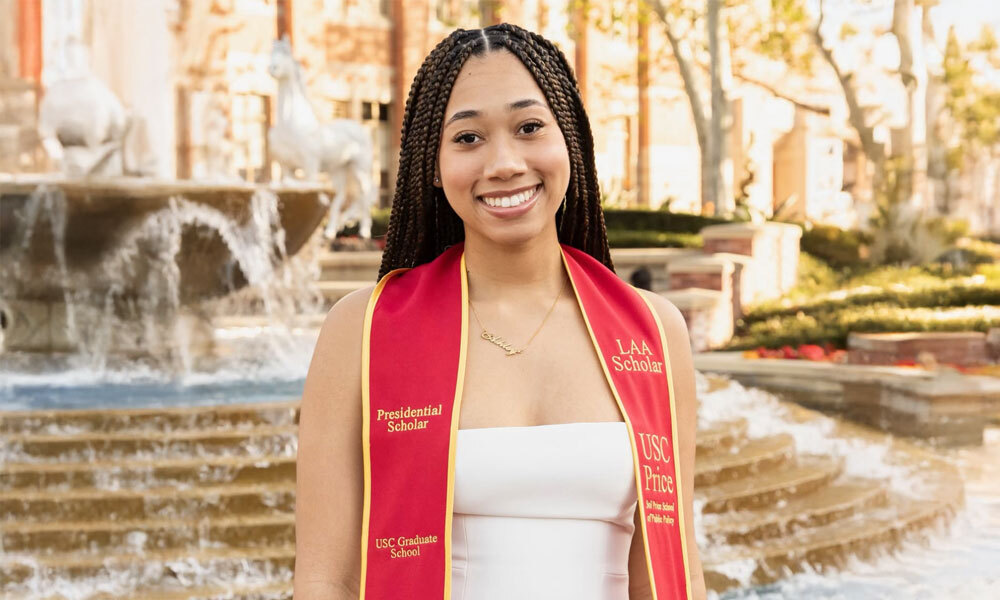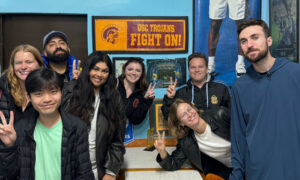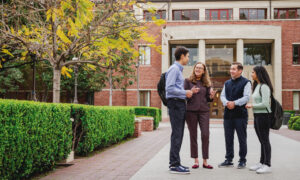Ashley Espinosa knows the Los Angeles Metro system better than almost anyone.
She’s been to every Metro train station. All 100 of them.
“I was able to experience the totality of LA Metro,” said Espinosa, a graduating USC Price School of Public Policy student. “I can see there’s so much potential, and there are a lot of things that need to be fixed.”
The soon-to-be Master of Urban Planning graduate spent summer 2023 inspecting Metro stations and parking lots for the agency, where she’s an administrative intern. Her reports were used by the Metro Transit Court to determine if riders were responsible for transit and parking violations. For example, if Espinosa found that a parking sign at a station was knocked over or covered in graffiti, a rider might win their appeal claiming they did not know parking was prohibited.
“I was able to help people tell their truths when it came to certain circumstances, where sometimes it really was just a mistake,” she said.
The summer job gave Espinosa special insight into one of the nation’s largest transit systems. As she crisscrossed L.A. on Metro trains, she noted how one’s experience with public transit largely hinged on where they lived or worked.
Take, for example, the A Line, which runs nearly 50 miles from Long Beach to Azusa. She found stations on the A Line near the San Gabriel Valley were well-maintained, featuring historic architecture. Yet taking that same train line south toward Long Beach revealed stations that received fewer resources.
“The first half of the A line is actually my favorite part of the Metro system – and then the second part of the A line was my least favorite,” she said. “If the entire line was treated the same, I feel like it would provide a great ridership experience throughout the full 50 miles.”
‘A great student’
The Metro internship is a perfect gig for Espinosa, who has long had a passion for urban planning. Growing up in Brooklyn, she often traveled back and forth between the Big Apple and Dominican Republic, where her father was a landlord. Seeing her father’s blueprints sparked her interest in architecture and planning as a child, while visits to the Dominican Republic exposed her to wealth disparities, such as the lack of infrastructure in lower income areas.
“I didn’t know how architecture could help people, and that was what I really wanted to do,” Espinosa said. “That’s how I stumbled upon urban planning, which still has that infrastructure side like architecture, but there’s that policy side that helps people.”
As a teenager, Espinosa became determined to attend USC because of its highly regarded urban planning program. She worked hard to become an SEO Scholar, a program that helps low-income students attend college, and won a USC Presidential Scholarship. Those scholarships allowed her to attend her dream school, where she’s made an impression on her fellow students and professors.
“In each course she was a wonderful student who committed herself to the topics, encouraged her classmates to participate, and welcomed criticism as she grew into a better student,” said David Sloane, Professor and Chair of the Department of Urban Planning and Spatial Analysis. “She has an infectious personality that radiates joy in being at USC, in urban planning, and thinking of ways to help her community. Just a great student.”

Master of Urban Planning
Make Cities More Just, Livable & Sustainable
USC’s MUP degree trains students to improve the quality of life for urban residents and their communities worldwide.
Find Out MoreEspinosa’s determination to help people was enriched last summer when she worked abroad in Greece. She interned at Stavros Niarchos Foundation (SNF), assisting the nonprofit’s grant approval team. As part of the gig, she visited organizations that received grants to evaluate how the foundation’s funding helped programs. She said one program serving refugee children brought her to tears.
“Unfortunately, some refugees are forced to separate from their children while trying to locate a new place to live. The organization, essentially like an orphanage, provides housing, food, and clothes. They make sure the kids get an education until families can get reconnected,” Espinosa said. “I think SNF was a really good experience because it’s the type of work I want to be a part of.”
Espinosa, who will graduate in May, also wants to be a part of LA’s plans to improve its transportation system ahead of the 2028 Summer Olympics.
“I would love to be part of that project just to make sure that the city is not only considering all the tourists coming, but also considering the Angelenos that are going to be here after the Games,” she said.




